Dumfries and Galloway Community Food Network was one of three pilot areas we invested in during Spring 2023 to support local work to build a stronger community food sector, tackle health inequalities and poverty. Background Propagate co-ordinates t …
Read ‘Dumfries and Galloway Community Food Network – building a network’ hereFood and health case studies
Scotland has a strong history of community food initiatives, from lunch clubs and food co-ops to youth cafés and gardening projects, all working to improve health and wellbeing in low-income areas and to address the needs of different groups of people.
Outer Hebrides Social Economy Partnership and Food Club – tackling food insecurity
The Outer Hebrides Social Economy Partnership and its joint work with the local Food Club was one of three pilot areas we invested in during Spring 2023 to support local work to build a stronger community food sector, tackle health inequalities and pov …
Read ‘Outer Hebrides Social Economy Partnership and Food Club – tackling food insecurity’ hereGranton Community Gardeners – community development in action
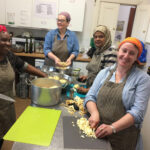
This case study looks at how a community gardening project started from a conversation between neighbours about a small piece of unused land and has grown into a local charity hosting regular community meals and events, group gardening sessions and tuition, and a number of thriving connected projects including a bakery, a chicken co-operative, and a free-shop.
Read ‘Granton Community Gardeners – community development in action’ hereNHS Lothian and community food networks – adapting to Covid-19 and recovery
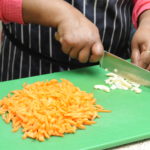
This case study provides an overview from NHS Lothian about the contribution that community food networks across the Lothians made towards the response to the Covid-19 pandemic.
Read ‘NHS Lothian and community food networks – adapting to Covid-19 and recovery’ hereElgin Youth Development Group – imaginative food and health activities
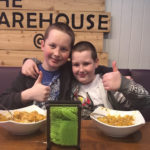
EYDG provide a safe social space for young people in the Elgin area. To support the work they do, they offer room and catering hire through their social enterprise, The Inkwell which allows them to offer work experience opportunities for young people throughout Moray.
Read ‘Elgin Youth Development Group – imaginative food and health activities’ hereMeal Makers – sharing home-cooked food with older people
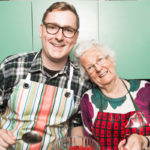
Run by the Food Train, Meal Makers is a community food sharing project which connects people who love cooking and want to be active in their community with older neighbours who would like home cooked food delivered to them every now and then.
Read ‘Meal Makers – sharing home-cooked food with older people’ hereHighland Poverty Action Network – adapting to Covid-19
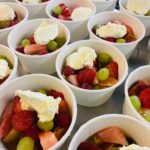
This case study looks at how MOO Food and Inverness Foodstuff from Highland Poverty Action Network reconfigured their work in response to Covid-19; and how NHS Highland is working with the network to plan recovery.
Read ‘Highland Poverty Action Network – adapting to Covid-19’ hereGreener Kirkcaldy – adapting to Covid-19
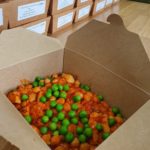
This case study looks at how Greener Kirkcaldy adjusted to lockdown with ‘Community Meals to Go’ and online cooking activities, and their plans to develop a community pantry with other innovations.
Read ‘Greener Kirkcaldy – adapting to Covid-19’ hereMoray Food Plus – adapting to Covid-19
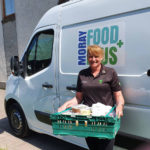
As an anchor organisation with a wide range of volunteering activities, Moray Food Plus had to reconfigure much of their work for lockdown, and have found that their partnerships with other organisations have proved invaluable.
Read ‘Moray Food Plus – adapting to Covid-19’ hereFife Health and Social Care – a pragmatic approach to cooking skills
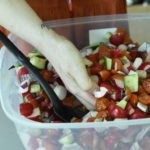
Lyndsay Clark from Fife Health and Social Care was a member of the CFHS cooking skills evaluation study group. In this case study, Lyndsay tells us what learning inspired her most and what changes she has since made to her own work to use a more pragmatic approach to cooking skills.
Read ‘Fife Health and Social Care – a pragmatic approach to cooking skills’ hereApex Stranraer – using community food to help ex-offenders move on
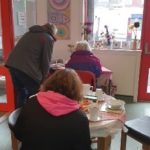
How does food and food work contribute to criminal justice programmes? Apex Stranraer show us how they involve their service users in community food activities, working with Fareshare and a local farm to source food.
Read ‘Apex Stranraer – using community food to help ex-offenders move on’ herePathfinder Dogs – Cooking Blind workshops
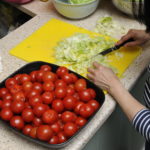
Anne Royle of Pathfinder Dogs recognised a need to support blind and partially-sighted people with basic meal preparation. She began by running ad-hoc sessions and was awarded CFHS funding to develop a series of workshops.
Read ‘Pathfinder Dogs – Cooking Blind workshops’ hereEdinburgh Community Food – learning from others
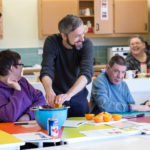
Edinburgh Community Food’s Chris Mantle was a member of CFHS Cooking Skills Evaluation Study Group. This case study describes now that group and networking with others shifted his thinking in how he and his colleagues run cooking skills courses.
Read ‘Edinburgh Community Food – learning from others’ hereForth Valley Sensory Centre – cooking courses for people with visual loss
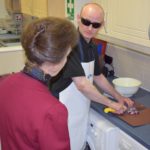
The Forth Valley Sensory Centre in Falkirk has been running popular cooking courses for people with visual loss. The classes began last year, led by the Centre’s Café Cook – David Black, who is blind himself. This case study looks at what he achieved and what challenges he had to overcome.
Read ‘Forth Valley Sensory Centre – cooking courses for people with visual loss’ hereConfidence to Cook – sharing evaluation skills to improve cooking skills courses
Fiona Matthew from the NHS Grampian Confidence to Cook programme took part in the CFHS cooking skills evaluation study group. In this case study, Fiona explains what she learned most from being part of the study group, what learning she passed onto others and in turn, what impact it had on their work.
Read ‘Confidence to Cook – sharing evaluation skills to improve cooking skills courses’ hereYCSA – using cooking to support young asylum seekers and refugees
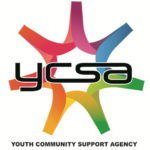
A cooking skills course for young asylum seekers and refugees in Glasgow has enabled Youth Community Support Agency (YCSA) to integrate a wide range of skills into their learning, as well as social contacts and ways into getting involved with the local community.
Read ‘YCSA – using cooking to support young asylum seekers and refugees’ hereWindmills Café – evaluating their service to young people with learning disabilities
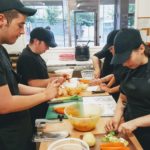
Joy and Chris from Windmills Café took part in a small group of community cafés looking at self-evaluation with CFHS. They used personal planning, relationship mapping and other tools to evaluate how successful their independent living skills training and employability service was.
Read ‘Windmills Café – evaluating their service to young people with learning disabilities’ hereSycamore Tree Café – evaluating their place in the community
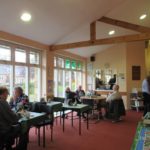
Violetta and Anne from Sycamore Tree Café took part in a small group of community cafés looking at self-evaluation with CFHS. They wanted to gauge how effective the café was as bridge between the church and the community, and whether volunteers and customers felt that they belonged to the café.
Read ‘Sycamore Tree Café – evaluating their place in the community’ hereOpen Door Café – evaluating their service to older people

Joanne and Hazel from Open Door Café took part in a small group of community cafés looking at self-evaluation with CFHS. They wanted to find out how well their Sunday Lunch and other activities helped reduce social isolation and whether diners felt a sense of belonging.
Read ‘Open Door Café – evaluating their service to older people’ hereKate’s Kitchen – evaluating their impact and finding out service users’ views
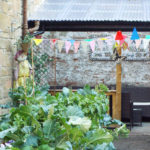
Anne and Karen from Kate’s Kitchen took part in a small group of community cafés looking at self-evaluation with CFHS. They wanted to find out what difference the ‘pay what you can’ café made to people’s lives and how users thought the gardening service could improve.
Read ‘Kate’s Kitchen – evaluating their impact and finding out service users’ views’ hereCommunity Food Stop – evaluating outcomes for volunteers
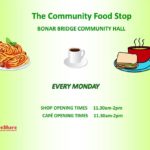
Beverley and Amanda from Community Food Stop took part in a small group of community cafés looking at self-evaluation with CFHS. Recognising that the project couldn’t run without volunteers, they decided to evaluate what people gained from volunteering there and what past volunteers had gone on to do.
Read ‘Community Food Stop – evaluating outcomes for volunteers’ hereNorth Edinburgh Arts community café – evaluating the volunteer journey
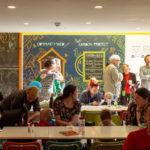
Caroline and Angela from North Edinburgh Arts Café took part in a small group of community cafés looking at self-evaluation with CFHS. They wanted to know what café volunteers gained from their experience there, from achievements to community connectedness.
Read ‘North Edinburgh Arts community café – evaluating the volunteer journey’ hereThe Usual Place – catering and hospitality skills for young people

The Usual Place community café was established to provide high-quality, strengths-based training around catering and hospitality for young adults aged 16-26 with additional support needs, with the aim of enabling them to move on to employment. The café is based in the centre of Dumfries.
Read ‘The Usual Place – catering and hospitality skills for young people’ here
Perth and Kinross Council – collaborating around local food
Perth and Kinross Council (PKC) Community Learning and Development (CLD) team was one of three pilot areas we invested in during Spring 2023 to support local work to build a stronger community food sector, tackle health inequalities and poverty. Bac …
Read ‘Perth and Kinross Council – collaborating around local food’ here